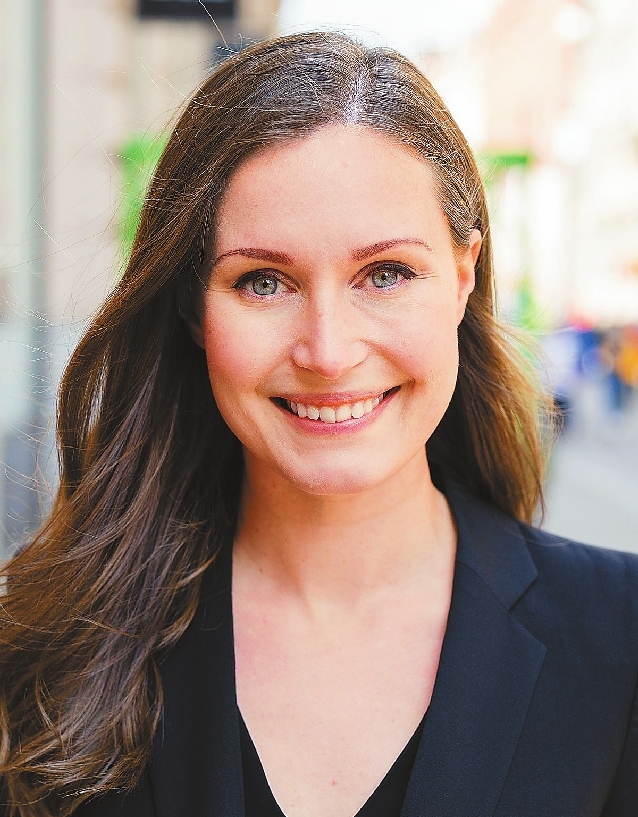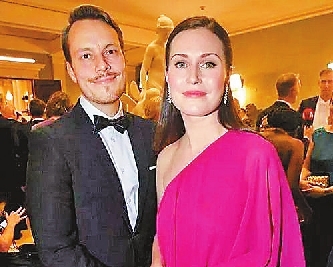

AT 34, Sanna Marin became the world’s youngest sitting prime minister when she was sworn in by the Finnish parliament Tuesday, but she is far from lacking in political experience. The former transport minister, who is also Finland’s third female prime minister, gained a reputation as a tough, straight-talking operator from her five years as leader of the city council in her hometown of Tampere, where she took office in 2012 aged 27. Marin’s rise to the pinnacle of Finnish Government means that when she takes over as head of the Social Democratic Party (SDP) next year, women will hold the top job in each of the five parties in Finland’s governing center-left coalition, and all but one of the leaders are aged under 35. Marin becomes not only Finland’s youngest-ever prime minister, but also the world’s youngest sitting head of government, ahead of Ukraine’s Prime Minister Oleksiy Honcharuk, who is currently 35. After being selected by her Social Democratic Party on Sunday to replace outgoing Prime Minister Antti Rinne, who quit last week over his handling of a postal strike, Marin deflected questions about her age. “I have never thought about my age or gender, I think of the reasons I got into politics and those things for which we have won the trust of the electorate,” she told reporters. Marin takes up the leadership at a volatile, polarized time in Finnish politics. The Social Democrats took office in June after defeating the far-right, anti-immigration Finns Party by the narrowest of margins in April’s general election, winning the premiership for the first time in 16 years. In those elections, support for centrist parties fell, and no party won even 18 percent of the vote. The victory was seen by some commentators as a triumph for Finland’s liberal, equal society over a party which ran on a ticket of cutting asylum levels almost to zero and halting anti-climate change measures. Since then, however, the polls suggest the SDP has dived in popularity to fourth place while the Finns party, led by hard-line former MEP Jussi Halla-aho, has risen to become the country’s most popular party by a margin of five points. Recent polling suggests that Marin was the most popular SDP politician to become the next prime minister, and she has said that winning back the trust of both the coalition parties and the electorate will be her first priority. “We have a lot of work ahead to rebuild trust,” Marin said. For many, Marin was a natural choice for her new role. “She doesn’t come out of nowhere,” said Johanna Kantola, a professor of gender studies at Finland’s Tampere University. “And she is quite well-liked.” Speaking to reporters shortly after being sworn in, Marin waved off questions about the global interest in her new appointment, saying she was focused on governing. “My thoughts have been in the proceedings and I have not followed the international and national media coverage,” she said. “We have promised change. Now we need action. I believe that trust will return through action.” Marin gained popularity as head of the Tampere City Council from 2013 until 2017, when YouTube videos of her leading contentious and often heated meetings drew national attention. “The style with which she managed the whole situation, she’s been quite admired for that,” Kantola said. “She is very centered on policies and issues, so she wants to talk about policies, not draw attention to herself.” Elected to parliament in 2015, Marin was re-elected in May 2019 and has served as the minister of transport and communications. Kantola called her a clear choice for prime minister. Marin is considered left-leaning, even within her party, and climate change, equality and social welfare are at the top of her agenda. On Tuesday, in a post on Twitter, she wrote about her commitment to building a better society in Finland. “Finland will not be finished in four years, but it can get better,” Marin wrote in the post. “That’s what we’re working on. I want to build a society where every child can become anything and every person can live and grow in dignity.” Marin has said that her childhood has strongly influenced her political priorities. Born in 1985 in Helsinki, she moved often as a child and has spoken about how coming from a low-income family made politics seem out of reach. “I am from a poor family and would not have been able to succeed and move forward were it not for the strong welfare state and the Finnish education system,” she told Helsingin Sanomat. Her parents separated when she was a child, and she was raised by her mother and her mother’s female partner, according to the article. She describes herself as being from a “rainbow family” and told the magazine she often felt invisible because she couldn’t talk openly about her family. “That was something that couldn’t be discussed,” she said. “It is only now in the 21st century that the debate about rainbow families has begun to be fairly open.” She now lives in Tampere with her husband and their young daughter, and said her family dynamic has shaped her political life. “For me, human rights and equality of people have never been questions of opinion but the basis of my moral conception,” she said in a statement on her website. “I joined politics because I want to influence how society sees its citizens and their rights.” In January this year, Marin, who has a degree in public administration, admitted in a newspaper interview to liking order both in politics and in her private life. “It’s always very tidy at home,” she told Finnish paper Helsingin Sanomat, adding that “The government has its own role, and labor organizations have theirs. It’s important these boundaries are kept to.” As mother of a 2-year-old daughter, Marin said Sunday that childcare will not interfere with her ability to be prime minister. “As this situation came as a surprise, it was reassuring that my husband messaged me to say he and my mother have already worked out how they will handle the practical childcare issues,” Marin said. Jenni Karimaki, a senior researcher at the Center for Parliamentary Studies at the University of Turku, said Marin’s rise could aid her party, which has struggled since taking the helm of government. “This is the new start that the Social Democrats have been looking for, for a long time now,” Karimaki said. She predicted that Marin would most likely become the official head of the party after its convention this summer. The coalition government under Marin is expected to continue prioritizing job creation and ambitious climate goals, seeking to render Finland carbon neutral by 2035. Marin won the leadership vote by a small margin, and her skills will be put to the test immediately as the country heads into a season of labor negotiations with the potential for strikes. Her predecessor, Rinne, was ultimately forced out of office after he made comments about a plan to cut wages for postal workers and his coalition partner, the Center Party, said it had lost confidence in him. The SDP will vote at its convention next June to determine whether Rinne will continue to lead the party or whether Marin or someone else will formally take over. The Social Democrats are particularly hampered by the country’s aging population, with pensioners making up a huge chunk of its backing. With public finances under pressure as the number of working-age people drops, the party’s traditional platform — a generous welfare society — is increasingly under threat. The government hopes to create at least 60,000 jobs to underpin its fiscal policy. But that pledge coincides with a cooling down in Finland’s economy. Further headwinds loom as trade unions demand pay increases, which risks undermining the competitiveness of Finnish exports. “The government’s road won’t be easy,” Marin said. “That’s OK. I’ve proven my abilities.”(SD-Agencies) | 
